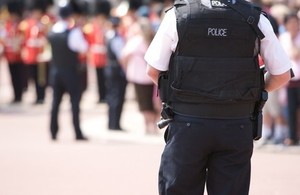Government proposes to tighten firearms licensing to protect the public
Home Office launches consultation on statutory guidance for police issuing firearms licences.

Firearms officer
The Home Office has today (23 July) launched a consultation on statutory guidance for police issuing firearms licences - which will ensure officers are consistently checking applicants’ medical records in order to better protect the public.
The independent police inspectorate, HMICFRS, previously found there was inconsistent police licensing practice across the country and that medical information was not being shared for firearms applications, creating a potential safety risk.
The draft statutory guidance, which includes the requirement for police to check medical records, will bring more clarity to the process, with the aim of ensuring licences are only issued to suitable applicants.
The department has drafted the guidance following discussions with the police, GPs and shooting organisations, who agreed that greater consistency was needed. It is now seeking further feedback on the draft guidance.
The Home Office has also signed an agreement with the British Medical Association (BMA) which the department hopes will improve cooperation between the police and GPs.
Nick Hurd, Minister for Policing and the Fire Service, said:
We have some of the toughest firearms controls in the world and we must do everything we can to ensure it stays this way.
We need to bring greater consistency to how firearms licences are issued and I am confident that the police, GPs and shooting groups agree. We have listened to their concerns and are proposing a way forward that tightens up the system without creating unreasonable demands.
The bottom line is public safety. Firearms must only be in the hands of the most safe and responsible people. This is not something we are prepared to compromise on.
The Memorandum of Understanding with the BMA marks a new commitment to safeguard doctors involved in the firearms application and monitoring system. This will allow them to work with the police to strengthen the system for assessing the heath information of firearms applicants.
It addresses the long-held concerns of GPs around liability, making it clear that the legal responsibility for judging whether someone is suitable to possess a firearm or shotgun certificate rests solely with the police.
GPs are asked to provide information about whether firearms applicants have a history of relevant mental or physical conditions which could affect their safe possession of guns. They are also asked to put a firearms flags on patient records so that police can be alerted if a person develops a relevant medical condition after their licence has been issued.
The Home Office has worked with the medical profession to encourage doctors’ use of the firearms flagging system. Alongside the Department of Health and Social Care, the Home Office is looking into how this system can be supported by a national IT system to make the use of these flags more widespread.